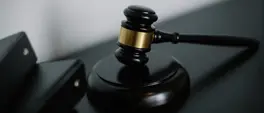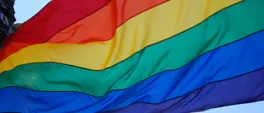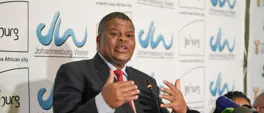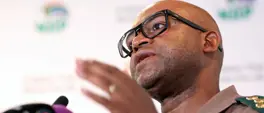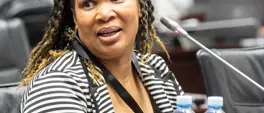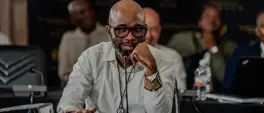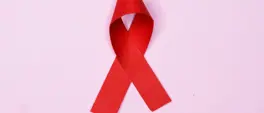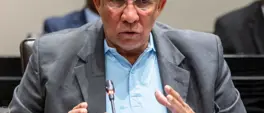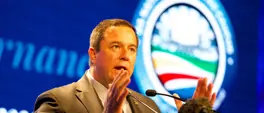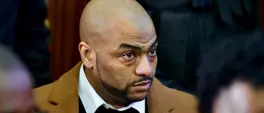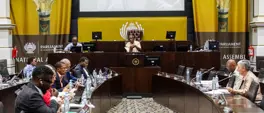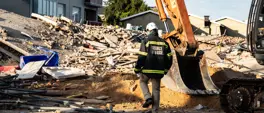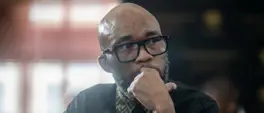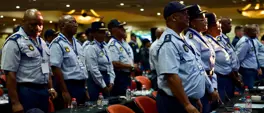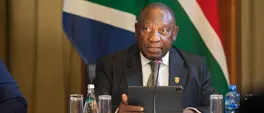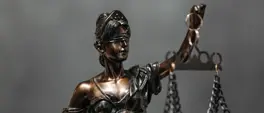JUDITH FEBRUARY | When burning becomes South Africa’s language of despair
Judith February
15 October 2025 | 10:56"It is time to lay down our proverbial chariots and swords if South Africa is to rebuild what has been lost in the fires."
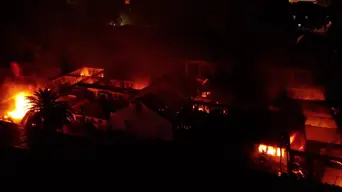
Fort Hare University buildings were on fire on Wednesday night, 8 October 2025. Photo: The Dreamer.
Fort Hare is burning. Not for the first time.
Last week protesters, who seem to be a mix of students and agitators, set campus buildings alight. Many things happen in South Africa on any given day. Much of it is laced with violence; taxi violence for instance is all too frequent mostly and tragically affecting those already at the margins of our society.
Most recently, Operation Dudula has taken it upon itself to police the entrances to hospitals, stopping migrants from entering- they are doing so illegally and often using force.
However where physical force is absent, it is the violence of the language of ‘them and us’ which is also being employed. Operation Dudula has announced its intentions to target schools to ‘put South Africans first.’ That language sounds alarmingly familiar as the rallying cry of US President Donald Trump’s MAGA brigade.
It is dangerous in every possible way and the casual attitude of authorities to this blatant xenophobia is deplorable. But then, given what we are hearing at the Madlanga Commission of Inquiry, we should not be surprised by police inaction. We should also not be surprised at the insouciance of politicians either, especially within the ANC.
Many senior ANC politicians have not been afraid to use xenophobia as cover for their own governance failures. Within cabinet, President Ramaphosa harbours Gayton McKenzie – a politician crudely and openly xenophobic.
We have seen in the recent past that xenophobia and associated rhetoric can lead to both violence and burning. Post-apartheid South Africa has had its fair share of burning. In May 2008, Ernesto Alfabeto Nhamuave, a 35-year-old Mozambican, was burnt alive during xenophobic violence which flared up on the East Rand. He was to become known as “the burning man”.
In 2016 students at the University of KwaZulu-Natal burnt part of their Law library in anger. Law students burning books, let that sink in for a minute. Just as UCT students burnt artwork during the #FeesMustFall protests.
At the time it was justified as a reasonable means of speaking truth to power regarding free higher education and ensuring that colonial artworks were destroyed in the UCT instance.
Both incidents left many understandably outragedand uncomfortable. Burning is a leitmotif in South African life. The reasons are complex and some of it has its roots in our violent past. Some of it.
Violence has always been a part of the South African landscape; physical violence, the violence of language and name-calling, and the violence of dispossession. From Peter Mokaba’s cry of “Kill the Boer! Kill the farmer!” to former president Jacob Zuma’s “Bring me my machine gun!”, violent imagery is regularly invoked in our politics.
In 2019, Julius Malema’s comment that “we [the EFF] are not calling for the slaughter of white people, at least for now” was yet another example of the violence of public discourse in South Africa.
There is something fundamentally wrong with the way in which we “do politics” in South Africa if burning is seen as the only language with which one can be heard. But equally, there must be something fundamentally wrong in a society where young people believe that destruction can pave any way to a meaningful and better future.
What kind of society have we birthed?
That we have had successive ANC-led governments and now and ANC-led GNU, which have repeatedly failed to lead a society in which the most vulnerable are given dignity and one which has failed to grasp the nettle of what it means for a society to be powered by education instead of greed, is the bitter dividend of freedom.
That we have a country where the rule of law is under serious threat makes criminality commonplace. Actions mostly don’t have consequences in South Africa. After all, those who looted and burned in July 2021 during the insurrection walk free, and those who instigated the burning of our Parliament remain free too.
It is this bitter dividend which has spawned despair and ugliness in equal measure. That ugliness was on full display at Fort Hare recently. How and why, we ask, even as we know that we cannot fully get to the bottom of such wanton destruction and disregard.
At the core of the discontent is a society unmoored from constitutional values and one which fails the most vulnerable daily. But we have also lost the ability to speak to each other in respectful ways.
As Lesley Cowling and Carolyn Hamilton have written in their introduction to the excellent book they edited, Babel Unbound: Rage, Reason and Rethinking Public Life: “The old ways of mediating collective life - through public discussion of one kind or another - seem to be falling away, overtaken by a new order of public spectacle, combativeness, hate speech and even violence.”
Burning is therefore a potent symbol of South African rage. Only destruction appears necessary and sufficient in the politics of now. We are in every way a country whose past is laced in violence and bloodshed. Even our much-vaunted negotiated settlement leading to the 1994 elections did not come without its bloody price.
So the rhetoric, its violence, our propensity towards breaking down and our inability to prefer reason over slogans and violence, leave us with the question- to those at Fort Hare and those in Operation Dudula, ‘After we burn down the edifice, what is left? After we speak violence and stop migrants from entering our hospitals and schools, what is left?’
Who builds after we tear down?
Professor Sakhela Buhlungu, Vice-Chancellor of For Hare University who believes that there is an orchestrated attack against him and the university by politicians, local strongmen and women afraid of the outcome of a Special Investigating Unit report on corruption at the university. In an illuminating, if saddening interview with Estelle Ellis Buhlungu has vowed to keep fighting despite an attempt on his life.
He has said bravely, “I will serve out my contract. I will wake up every day and do what must be done. But it is now in a different context. We are now not working for renewal; we will have to rebuild, and that is what will occupy us. Also, the fibre of the institution that was torn and destroyed,”he said.
We should let these words sink in.
The nihilism displayed in the burning of a university building also tells us something about the careless way in which the preservation of knowledge is viewed. It seems that those responsible for acts of violence inhabit a world in which there are no boundaries to their conduct and in which democracy and deliberation become casualties of their collective rage and the urgency of the moment.
It is hard to find the answers in such incendiary circumstances and sometimes we can only lament for the future of our country.
We understand fully what Rebecca Solnit means when she says: ‘‘You can feel terrible and remain committed, e heartbroken and know the future is being made in the present”.
How else would we still be straining to create, live, find joy and build community despite the challenges we face? And we still long for a country free of burning and one which is a truly open and transparent democracy. That building requires work which may seem tired and tedious.
It comes in the form of speaking out, challenging authority and continuing in our collective attempts to find solutions to what often seems like intractable problems. And it comes in the form of holding all those in power to account for their failures of governance and ever-increasing levels of inequality. That is the work of democracy.
Margaret Atwood also makes a powerful call for putting shoulder to the proverbial wheel. She says of our choices: “If it’s open democracy, we’ve got some work ahead of us.
We must roll up our proverbial sleeves, grab ourarrows of desire, sharpen the paring knives of our wits, dedicate our swords to the pursuit of truth, strengthen our resolve, resist the serpents of false argument, hop into our chariots of fire.
“But desperate times require desperate remedies, and our times are desperate. However, instead of all these chariots and swords, I’ll propose something simpler. Don’t panic. Think carefully. Write clearly. Act in good faith. Repeat.”
It is time to lay down our proverbial chariots and swords if South Africa is to rebuild what has been lost in the fires.
Get the whole picture 💡
Take a look at the topic timeline for all related articles.
